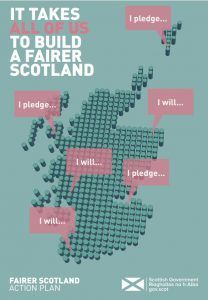In 2015, the Scottish Government launched a wide-ranging ‘national discussion’ called Creating a Fairer Scotland. Over the second half of the year, a large number of consultation events were held across the country, as people from all sectors were invited to set out their vision of what a fair Scotland would look like by the year 2030. The purpose was to explore what changes the Scottish Government could promote to address Scotland’s deep-rooted poverty and deprivation issues.

The Action Plan was launched on 5 October at the Prince’s Trust’s Wolfson Centre in Glasgow
Angela Constance MSP, Cabinet Secretary for Communities, Social Justice and Equalities outlined the Scottish Government’s formal response to the consultations at a launch event in Glasgow yesterday. The Fairer Scotland Action Plan sets out five themes and fifty action points that the Scottish Government will be working towards. The paper also reports plans to progress the 15 policy recommendations produced by Naomi Eisenstadt, the First Minister’s poverty and inequalities adviser, in her well-received early 2016 report, Shifting the Curve.
The action points include:
- An announcement that a Socio-Economic Duty on public bodies, requiring the formal assessment on how policy or service changes will impact upon people living in poverty, will be implemented in 2017, with a consultation to launch “very soon”.
- A £29m Tackling Poverty Programme, which will be available to community and third sector groups to “design, test and deliver new approaches to tacking poverty”.
- The establishment of a Poverty and Inequality Commission in 2017/18, to monitor progress and identify further actions to address deprivation.
- Setting a target for Councils to have 1% of their budgets dedicated to participatory budgeting.
- A range of specific measures to address child poverty, support for young people, fair work practices, discrimination, and support for refugees, older people and people with physical & mental health challenges.
Responding to the Action Plan, SURF Chief Executive Andy Milne said: “SURF’s 2016 Manifesto for Community Regeneration identified a set of nine bold and practical policy recommendations that our network believe would go some way towards tackling poverty in Scotland’s disadvantaged places. At the top of our list was the introduction of a Socio-Economic Duty across all public policy.
“I am delighted to see 2017 implementation of the Duty as priority number one in the Scottish Government’s Fairer Scotland Action Plan. There are a number of other Action Plan commitments that reflect SURF’s Manifesto content. These include enhanced support for participatory budgeting, community led regeneration, and fair work practices.
“As the Cabinet Secretary noted in her launch event speech yesterday, the challenge now is for all of us to translate rhetoric into meaningful action. We look forward to working with her and Scottish Government colleagues to that end. We will do so by highlighting the reality of the challenges, as well as ‘what works’ in community regeneration in Scotland, including practical examples and ideas identified through our Manifesto consultations, our Alliance for Action initiative, and our SURF Awards programme.”
